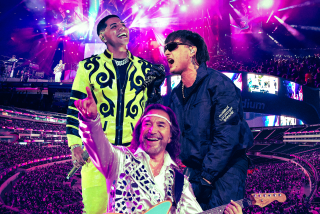BLACK FLAG--L.A.’S PUNK BAD BOYS RETURN HOME
For a year, Black Flag has been touring steadily, playing its distinctive, raw music in cities all across America--except, that is, for its hometown of Los Angeles.
“We’ve been touring to the point where I think people around the country really know us,” says the band’s guitarist, Greg Ginn. “But we’re a little behind in L.A. I think this town has missed out on a few phases of Black Flag.”
When the group plays the Stardust Ballroom tonight, in fact, it’ll be its first L.A. show in more than a year--and the last one was as opening act for the Ramones, which means the crowd was filled with more Ramones fans than Black Flag devotees.
Since then, they’ve virtually ignored the town where they started and where they built a following for their initially hard-core punk music before evolving an intense sound that threw in touches of heavy metal and Ornette Coleman-style jazz.
“There’s a lot of distractions in L.A.,” explained Ginn this week during an interview in the band’s messy Torrance office. “Outside of California, people take Black Flag as a band that has released a lot of records and done a lot of touring. Inside California there’s more media attention, people are more judgmental and they try to figure out our concepts instead of listening to the music.”
“Also,” he added with a laugh, “most of the time we haven’t played well here. One of our goals this year is to play as much as we can around L.A. to try and change that. Saturday will be the first show, but not the best one, because we just got a new bass player.”
Touring hasn’t been Black Flag’s only outlet lately. Since 1981, the band has released nine albums and various EPs and cassettes, including a recent all-instrumental album and the upcoming “Live 85” LP.
Meanwhile, Ginn has played on or produced records by Tom Troccoli’s Dog, Painted Willie, Oktoberfaction and a new band he recently formed, Gone. Lead vocalist Henry Rollins, meanwhile, has written books of poetry, gone on nationwide spoken-word tours and written articles for Spin magazine.
The band never became less of a priority, said Ginn, but those projects, and the varied nature of the Black Flag records, have made the band hard to categorize and kept it from retaining the crown as kings of L.A.’s hard-core scene.
“I don’t know if that scene everybody wrote about ever really existed, but in terms of our audience, we’ve always been outside of whatever scene there was,” Ginn insisted. “And we’re still somewhere on the outside. We don’t think about keeping fans or making career moves.
“There’s a lot of extreme cynicism in L.A., a lot of people who think that we calculate everything, make career moves and come up with concepts. We don’t do real well in those kind of waters, because we don’t calculate. To me, Black Flag isn’t a concept--it’s my total life.”
This devotion makes it hard for Black Flag to keep musicians, said Ginn--the sole original member. It also means it’s time for a break: The band’s current tour will be its last for some time.
Said Ginn, “We’ll all just be doing different things for a while. It’s been a little bit frustrating to me, I guess, because music is my total existence and in that sense I’m very demanding of the people I’m playing with.
“That’s a lot to ask of other people. When you’re a member of Black Flag, there’s not a lot in it for you but the notes you play. And if you’re not always into those notes as much as I, it’s hard to get by.”
No more Black Flag records are planned at the moment, but, said Ginn, that doesn’t mean the band won’t decide to go into the studio when it gets off the road.
“We may take advantage of the time we’re not touring to do a record that isn’t tour-oriented--maybe something electronic. I’ve been working on lots of things, and how it all fits together with Black Flag we’ll have to wait until after the tour to see.”
More to Read
The biggest entertainment stories
Get our big stories about Hollywood, film, television, music, arts, culture and more right in your inbox as soon as they publish.
You may occasionally receive promotional content from the Los Angeles Times.










